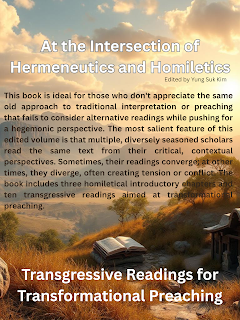Tuesday, May 6, 2025
See the world wider, think critically, and act boldly
Immanuel Kant
Sunday, May 4, 2025
The Burning Bush and Divine Revelation
אֶהְיֶה אֲשֶׁר אֶהְיֶה (Exod 3:14)
"I am that I am" (my translation)
The above saying characterizes me. I am that I am. I am irreplaceable by anything or anyone. I am awesome because I am God's masterpiece. I must believe it. Nothing or no one can bring me down or describe me fully or adequately. No matter what happens, God's love remains strong and unchanged. So I am that I am.
Biblical Studies and Life
Saturday, May 3, 2025
“The Samaritan as a Paragon of Self-Love and Neighborly Love (Luke 10:25-37)”
Friday, May 2, 2025
Wisdom
"Wisdom is the fusion of knowledge and experience that empowers us to navigate life's complexities, guiding us to live with insight and purpose across all cultures." (Yung Suk Kim, 2025)
"every thing changes"
“Everything changes.” (anicca, from Buddhist trad.)
הבל
“Vapor, breath” (Eccl. 1:2)
“The only constant in life is change.” (Heraclitus)
“Change is inherent to being human; the key lies in understanding and embracing it. A creative life emerges from a vortex of change.” (Yung Suk Kim)
Wednesday, April 30, 2025
AT THE INTERSECTION OF HERMENEUTICS AND HOMILETICS
This book is ideal for those who don't appreciate the same old approach to traditional interpretation or preaching that fails to consider alternative readings while pushing for a hegemonic perspective. The most salient feature of this edited volume is that multiple, diversely seasoned scholars read the same text from their critical, contextual perspectives. Sometimes, their readings converge; at other times, they diverge, often creating tension or conflict. The book includes three homiletical introductory chapters and ten transgressive readings aimed at transformational preaching.
Tuesday, April 29, 2025
Embrace Change
-Yung Suk Kim
Thursday, April 24, 2025
My Rose
I cradle its tender beauty each day,
watering it with devotion and gentle hands.
It is more than a plant; it is my love incarnate,
a soothing balm that heals my soul,
whispering secrets of hope as its floral leaves unfurl
in the embrace of each new dawn.











